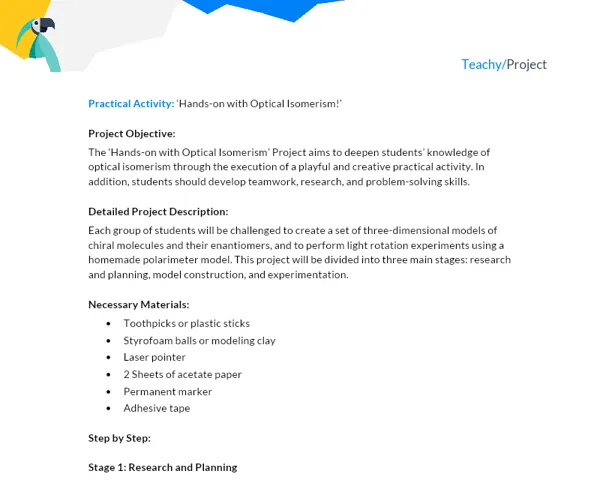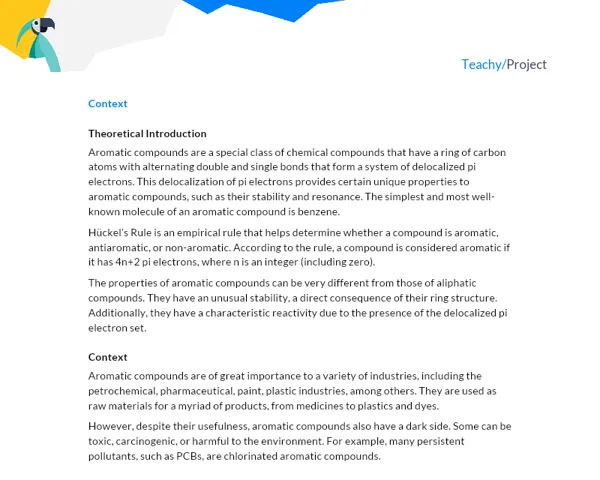Contextualization
Organic chemistry is a branch of science that studies the structure, properties, composition, reactions, and synthesis of organic compounds, which contain carbon. For many decades, it was believed that these compounds could only be derived from living beings, in a vital force that only nature could provide. Today, we know that this science is an ocean of possibilities in creating new materials and medicines, and to understand how these compounds react, we need to understand organic reactions.
Organic reactions are chemical processes that involve organic compounds, during which reactants are converted into products. The details of how and why these reactions occur are complex and fascinating. They allow us to understand, predict, and manipulate chemical processes, from cooking dinner to manufacturing life-saving medicines.
In the real world, organic reactions are fundamental for the development of new medicines, materials, dyes, fuels, polymers, and many other substances that are part of our daily lives. Furthermore, the problems associated with these reactions, such as selecting reagents, choosing reaction conditions, identifying the products formed, and synthesis routes, are challenges faced by chemists in the development of new processes and products.
Theoretical Introduction
We will enter the universe of organic reactions and understand how we can predict products, choose reagents, and synthesis routes. To do this, we will address concepts such as types of organic reactions, reaction mechanisms, chemical kinetics, and chemical equilibrium, which are fundamental for this understanding.
Reaction mechanisms refer to the step-by-step process that occurs for reactants to transform into products. It allows us to understand why, when mixing certain substances, certain reactions occur and not others. Chemical kinetics, in turn, is related to the speed of reactions and how factors such as concentration, pressure, and temperature influence them.
Students will develop practical and theoretical activities in which they will identify, predict, and propose organic reactions. They will also face real problems, where they will have to select reagents and define synthesis routes to obtain an organic product, based on proposed bibliographic references.
For the theoretical support of the project, we recommend the following resources:
- Book "Organic Chemistry" by Paula Y. Bruice.
- Book "Organic Chemistry" by John McMurry.
- Federal University of Viçosa Portal on mechanisms of organic reactions.
- Science in Action Channel on YouTube, with several classes on organic chemistry.
- Brazil School Portal with various content on organic chemistry.
Finally, interdisciplinarity will be explored in this project, relating Chemistry to other disciplines such as Biology and Physics.
Practical Activity
Title: "Unraveling Organic Reactions: From Theory to Practice"
Project Objective:
- Understand and apply theoretical concepts related to organic reactions.
- Identify and predict products of organic reactions.
- Select reagents and synthesis routes to obtain an organic product.
- Develop teamwork skills and time management.
Project Description:
The project will consist of two main moments:
Moment 1 - Theory in Action: Groups must study the theory of organic reactions. After the study, they must select two organic reactions (one addition and one substitution) to simulate. The simulation can be done physically, with molecular models, or digitally, using software or applications for simulating chemical reactions.
Moment 2 - Solve the Problem: Groups will be challenged. They will receive the description of an organic product that must be synthesized. From this challenge, students must select the appropriate reagents and define the synthesis route to obtain this product.
Necessary Materials:
- Books or online resources for theoretical study.
- Molecular models or software/applications for simulating chemical reactions.
- Paper and pen for sketching reactions and synthesis routes.
Step by Step:
- Divide into groups of 3 to 5 members.
- Study the theory of organic reactions using the suggested materials or others of your preference.
- Select two reactions to simulate: one addition and one substitution.
- Perform the simulation of the chosen reactions, presenting the reagents, the development of the reaction, and the products formed.
- Present the simulation and its theoretical explanation to the class.
- After the presentation, groups will receive a challenge: the description of an organic product that must be synthesized.
- Groups must research and select the appropriate reagents, as well as define the synthesis route to obtain this product.
- Each group must prepare a presentation of the solution to the proposed challenge, explaining the choice of reagents and the synthesis route.
Project Deliverables and Document Writing:
At the end of the project, students must submit a report containing the following sections:
- Introduction: Provide context for the theme worked on, its relevance, the theory studied, and the project's objective.
- Development: Explain the concepts studied and present in detail the simulations performed and the solutions proposed for the challenge. Describe the reagents, reactions, and chosen synthesis routes, justifying your choices.
- Conclusion: Summarize the main points of the work, the learnings obtained, and the conclusions about the project and the theme of organic reactions.
- Bibliography: List all resources used in the project.
Remember, the report should be an expression of your learning and teamwork, make it an instrument of your learning, not just a formality.


